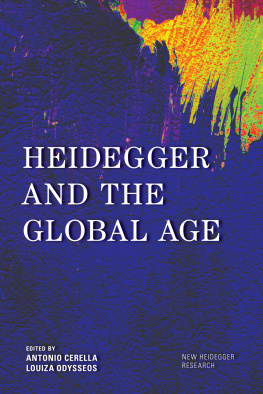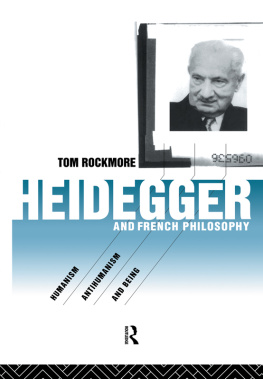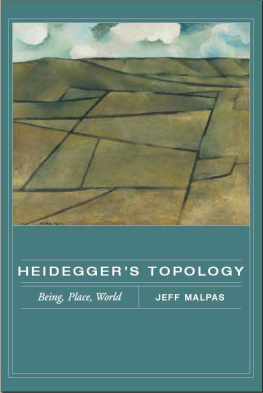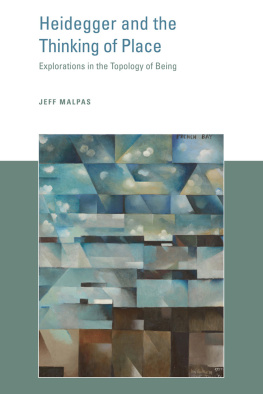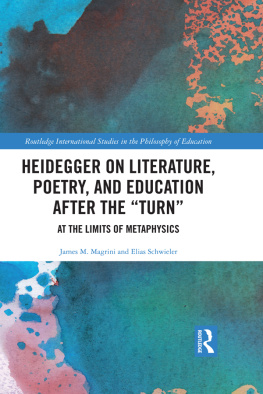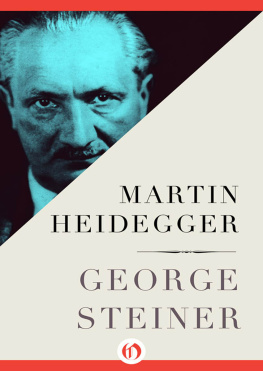Antonio Cerella - Heidegger and the Global Age
Here you can read online Antonio Cerella - Heidegger and the Global Age full text of the book (entire story) in english for free. Download pdf and epub, get meaning, cover and reviews about this ebook. year: 2017, publisher: Rowman & Littlefield, genre: Romance novel. Description of the work, (preface) as well as reviews are available. Best literature library LitArk.com created for fans of good reading and offers a wide selection of genres:
Romance novel
Science fiction
Adventure
Detective
Science
History
Home and family
Prose
Art
Politics
Computer
Non-fiction
Religion
Business
Children
Humor
Choose a favorite category and find really read worthwhile books. Enjoy immersion in the world of imagination, feel the emotions of the characters or learn something new for yourself, make an fascinating discovery.
- Book:Heidegger and the Global Age
- Author:
- Publisher:Rowman & Littlefield
- Genre:
- Year:2017
- Rating:5 / 5
- Favourites:Add to favourites
- Your mark:
- 100
- 1
- 2
- 3
- 4
- 5
Heidegger and the Global Age: summary, description and annotation
We offer to read an annotation, description, summary or preface (depends on what the author of the book "Heidegger and the Global Age" wrote himself). If you haven't found the necessary information about the book — write in the comments, we will try to find it.
Heidegger and the Global Age — read online for free the complete book (whole text) full work
Below is the text of the book, divided by pages. System saving the place of the last page read, allows you to conveniently read the book "Heidegger and the Global Age" online for free, without having to search again every time where you left off. Put a bookmark, and you can go to the page where you finished reading at any time.
Font size:
Interval:
Bookmark:

Richard Polt, Professor of Philosophy, Xavier University, USA
The New Heidegger Research series promotes informed and critical dialogue that breaks new philosophical ground by taking into account the full range of Heideggers thought, as well as the enduring questions raised by his work.
After Heidegger?, edited by Gregory Fried and Richard Polt (Forthcoming)
After the Greeks, Laurence Paul Hemming (Forthcoming)
Correspondence 19491975, Martin Heidegger, Ernst Jnger, translated by Timothy Quinn
Heidegger and Jewish Thought, edited by Micha Brumlik and Elad Lapidot (Forthcoming)
Heidegger and the Environment, Casey Rentmeester
Heidegger and the Global Age, edited by Antonio Cerella and Louiza Odysseos
Heidegger in Russia and Eastern Europe, edited by Jeff Love
Heideggers Gods, Susanne Claxton
Making Sense of Heidegger, Thomas Sheehan
Proto-Phenomenology and the Nature of Language, Lawrence J. Hatab
The Question Concerning the Thing: On Kants Doctrine of the Transcendental Principles, Martin Heidegger, translated by Benjamin D. Crowe and James D. Reid. (Forthcoming)
Published by Rowman & Littlefield International Ltd
Unit A, Whitacre Mews, 2634 Stannary Street, London SE11 4AB
www.rowmaninternational.com
Rowman & Littlefield International Ltd.is an affiliate of Rowman & Littlefield
4501 Forbes Boulevard, Suite 200, Lanham, Maryland 20706, USA
With additional offices in Boulder, New York, Toronto (Canada), and Plymouth (UK)
www.rowman.com
Selection and editorial matter 2017 Antonio Cerella and Louiza Odysseos.
Copyright in individual chapters is held by the respective chapter authors.
All rights reserved. No part of this book may be reproduced in any form or by any electronic or mechanical means, including information storage and retrieval systems, without written permission from the publisher, except by a reviewer who may quote passages in a review.
British Library Cataloguing in Publication Data
A catalogue record for this book is available from the British Library
ISBN: HB 978-1-78660-230-5
Library of Congress Cataloging-in-Publication Data Available
ISBN: 978-1-78660-230-5 (cloth : alk. paper)
ISBN: 978-1-78660-232-9 (electronic)
 The paper used in this publication meets the minimum requirements of American National Standard for Information Sciences Permanence of Paper for Printed Library Materials, ANSI/NISO Z39.481992.
The paper used in this publication meets the minimum requirements of American National Standard for Information Sciences Permanence of Paper for Printed Library Materials, ANSI/NISO Z39.481992.
Printed in the United States of America
For the people of LAquila,
who witnessed the disappearance of their world
and who, despite everything, are seeking to reanimate it through their being.
At the end of a long intellectual journey, it is only right to look back and acknowledge our debts to those institutions that have made this research possible. Our thanks go to the British International Studies Association (BISA), the School of Global Studies of the University of Sussex and its Center for Advanced International Theory (CAIT) for supporting and funding the workshop on Heidegger and the Global Age (2930 October 2015), which laid the foundations of this volume. We also owe thanks and gratitude to the Series Editors, Gregory Fried and Richard Polt, for their constructive comments on an early version of this book, and to the anonymous reviewers who with their thoughtful criticisms have certainly improved the quality of this project. Special thanks, however, go to our contributors, without whom this volume would have not seen the light of the day.
Following the publication of the so-called Schwarze Hefte, Heidegger scholarship has, once again, entered into a crisis. Behind the accusations and condemnations, judgments and prejudgments, absolutions and excommunications, lurks something more profound than an academic interpretation or a page in the history of ideas. The crisis of Heideggerian thinking should be placed within the broader process of obliteration of the human sciences that, slowly but firmly, is propagating across the academic system. The answer to the question of whether or not Martin Heideggers thought should be thrown away, along with the violent world that elicited it, is only partially contained in the following pages. However, if a thought is still capable of provoking more thought and a fight for the truth; if a philosophy is still able to give a different atmosphere to things, to shed a magic light on them, it must necessarily be related to life.
This book is dedicated to the people of LAquila, who witnessed the devastation of their world caused by the earthquake. In their testimonies, one can still encounter that direct and deep experience of space, which is philosophically articulated by Heidegger: the worries, tears, grief, mourning, sorrow, compassion and altruism of those who, within a few moments, were left without the totality of involvements that generates the meaning of being-in-the-world. Yet, paradoxically, this physical destruction the tragic erasing of space has not removed the experience of place; the disappearance of the visible world has not swallowed the invisible one as well but, in some cases, has strengthened it, providing this invisible place with a more distinct boundary, an indelible memory from which to replenish itself. It is as if the soul of a world is sedimented in the remains, in the survivors. Thus, in the poignant testimony of one survivor, one can still discern the epochal relevance of the question of being: My house is intact but my sister Claudia is gone. Sometimes after lunch she would give me a ride to work: we would stroll along via Strinella, and park near the Villa Comunale for a coffee at the Chalet. Sometimes C. would join us and, afterwards, I would go towards Collemaggio, my sister and C. towards the city centre. Via Strinella is semi-deserted now, the Chalet is one of the few bars still open near the historic centre and one can easily park near the Villa because almost no one works there anymore. C. moved to Pescara. I take my coffee alone, moving within a microcosm that I dont recognize, thinking about all those losses we Aquilani will hardly ever fill. But I will stay here for you, sister!
Peg Birmingham is professor of philosophy at DePaul University in Chicago, United States. She is the author of Hannah Arendt and Human Rights: The Predicament of Common Responsibility (2006), co-editor (with Philippe van Haute) of Dissensus Communis: Between Ethics and Politics (1996) and co-editor (with Anna Yeatman) of Aporia of Rights: Citizenship in an Era of Human Rights (2014). She is the editor of Philosophy Today.
Antonio Cerella is lecturer in politics, international relations and human rights at Kingston University, London, United Kingdom. He is convenor of CRIPTBritish International Studies Association working group on contemporary research on international political theory. He is the co-editor of Mimetic Theory and International Studies (2015); The Sacred and the Political: Explorations of Mimesis, Violence and Religion (2016); Carl Schmitt, Political Theology and Modernity (2016); and Machiavelli and International Relations: Critical Reassessments
Font size:
Interval:
Bookmark:
Similar books «Heidegger and the Global Age»
Look at similar books to Heidegger and the Global Age. We have selected literature similar in name and meaning in the hope of providing readers with more options to find new, interesting, not yet read works.
Discussion, reviews of the book Heidegger and the Global Age and just readers' own opinions. Leave your comments, write what you think about the work, its meaning or the main characters. Specify what exactly you liked and what you didn't like, and why you think so.

